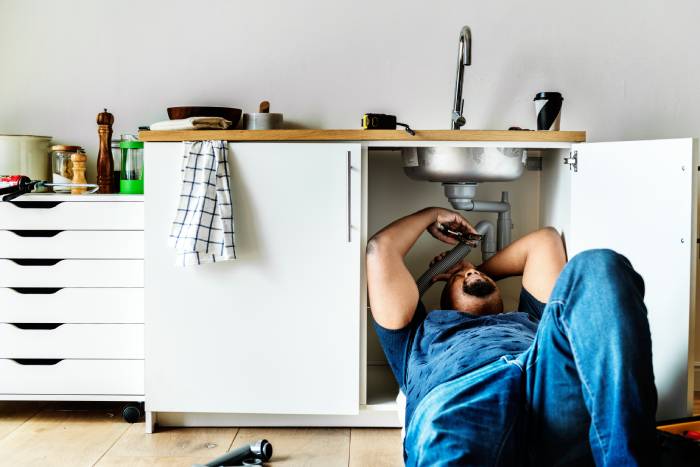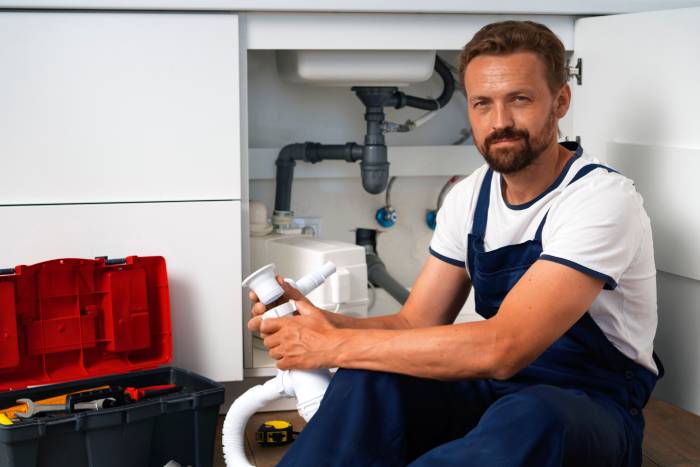
A clogged drain can seriously damage your plumbing system, fixtures, and appliances. If you continue to ignore blocked drains, it will not be too long before you have a clogged toilet, backed-up bathroom and kitchen sink, or standing water during showers. Grease buildup, including hair, food, soap residue, and other things, should be cleared right away. In this post, we’ll discuss the common signs of a clogged drain and how you can fix clogged or blocked drains to prevent further plumbing damage.
Common Signs of a Clogged Drain
If you notice slow drainage or gurgling noise coming out from your drains, it’s important to address the clog promptly to prevent expensive repairs and avoid potential health hazards. Minor clogs can often be cleared using DIY methods, but persistent or severe blockages may require the assistance of a professional plumber.
A clogged drain can manifest itself in various ways depending on the location of the clog. Here are some common signs:
- Slow drainage — Slow water draining from sinks, tubs, or showers is a classic sign of a clogged drain. If you notice that water is taking longer than usual to drain, it could indicate a partial blockage in the pipe.
- Foul odors — Accumulated debris and organic matter can emit unpleasant odors. If you detect foul smells coming from your drains, even after cleaning, it may be a sign of a clog that needs attention.
- Gurgling noises — When water struggles to pass through a drain, it can create gurgling or bubbling sounds. These noises typically occur when you’re running water down the affected drain or when water is draining from nearby fixtures.
- Water backups — In severe cases, a clogged drain can cause water to back up into sinks, tubs, or showers. This backup may be accompanied by gurgling sounds or unpleasant odors. If you notice water pooling around drains or overflowing from fixtures, it’s a clear indication of a serious clog.
- Standing water — Standing water in sinks, tubs, or showers is a clear sign of a clogged drain. If water doesn’t drain away properly and instead accumulates in the fixture, there’s likely a blockage preventing proper drainage.
6 Ways to Clear a Clogged Drain
Always exercise caution when clearing a clogged drain. Avoid using excessive force or harsh chemicals that could damage your plumbing system. If you’re unsure about how to proceed or if the clog persists despite your efforts, don’t hesitate to seek professional help.
Here are several steps you can take to clear a clogged drain:
Plunging
A plunger can often help with minor clogs in sinks, tubs, or showers. Make sure there is enough water in the fixture to cover the plunger head, then create a tight seal around the drain and pump the plunger up and down vigorously several times. This action can help dislodge the clog and allow water to flow freely again.
Boiling water
For clogs caused by grease or soap scum buildup, pouring boiling water down the drain can sometimes dissolve the blockage. Boil a pot of water and carefully pour it down the drain in stages, allowing it to work for a few seconds between each pour.
Baking soda and vinegar
This natural cleaning solution can help break down organic matter and clear minor clogs. Start by pouring a pot of boiling water down the drain, then follow it with a mixture of 1/2 cup baking soda and 1/2 cup vinegar. Cover the drain and let the solution fizz for about 10-15 minutes before flushing with hot water.
Plumbing snake
Also known as a drain auger, a plumbing snake is a flexible tool that can reach deep into drainpipes to break up and remove stubborn clogs. Insert the snake into the drain and rotate it clockwise while pushing it further into the pipe. Once you feel resistance, continue rotating and pushing until the snake breaks through the clog. Pull the snake back out and flush the drain with water to clear any remaining debris.
Chemical drain cleaners
While these products can be effective for clearing some clogs, they should be used with caution. They contain harsh chemicals that can damage pipes and pose health risks if not handled properly. If using a chemical drain cleaner, follow the manufacturer’s instructions carefully and wear protective gloves and eyewear.
Call a plumber
If DIY methods are unsuccessful or if you’re dealing with a particularly stubborn or recurring clog, it may be time to call a professional plumber. A plumber will have the tools and expertise to diagnose and resolve the issue safely and effectively.

Frequently Asked Questions
What causes drains to become clogged?
Drains can become clogged due to a variety of reasons, including the accumulation of hair, soap scum, food particles, grease, mineral deposits, and foreign objects such as toiletries or small toys. Additionally, tree roots infiltrating sewer lines, inadequate pipe slopes, and aging plumbing systems can contribute to clogs.
Can I use chemical drain cleaners to unclog my drain?
While chemical drain cleaners can be effective for clearing some clogs, they should be used with caution. These products contain harsh chemicals that can damage pipes and fixtures over time, and they may not be suitable for all types of clogs. If you have concerns about the safety or effectiveness of chemical cleaners, it’s important to follow the manufacturer’s instructions carefully and consider alternative methods.
How do I prevent clogged drains in the future?
Preventing clogged drains involves adopting good maintenance habits such as using drain strainers or screens to catch debris, avoiding pouring grease or oil down drains, flushing drains regularly with hot water, and being mindful of what you dispose of in sinks, toilets and drains. Additionally, scheduling periodic professional drain cleaning and inspections can help identify and address potential issues before they escalate.
Can I use DIY methods to unclog a main sewer line?
While DIY methods may be suitable for minor clogs in individual drains, attempting to clear a main sewer line yourself can be challenging and may cause further damage if not done correctly. Main sewer line clogs often require specialized equipment and professional expertise to resolve safely and effectively. It’s advisable to consult a licensed plumber for assistance with main sewer line issues.
Conclusion
One of the best ways to address a possible clogged drain before it becomes serious is to clean your drains regularly. If you’re clogged drain persists after you have exhausted all possible DIY solutions, it’s time to call in the pros. At True Plumbing, we are equipped with the knowledge, techniques, and tools to unclog drains. Contact us today.

